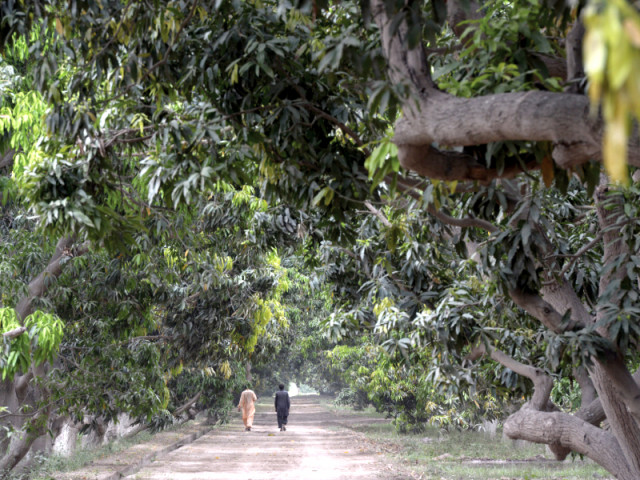Cashing opportunity: Pakistani mango ripens in time to edge India out of EU
European nations banned India’s Alphonsos after fruit flies were found in shipments.

Farmers walk in a mango farm some 40 kilometres north-east of Multan. PHOTO: AFP
Pakistani mango growers are hoping to take a slice out of rival India’s export market thanks to tough new European regulations.
The sweet yellow fruit is a contentious matter regionally, with both countries proclaiming it a national treasure and fighting over whose specimens are superior. Economically, at least, mango exports are one area where Pakistan appears to have a slight edge.
According to respective official figures, Pakistan last year exported around 100,000 tonnes for a revenue of $48.6 million over India’s 56,000 tonnes for $44.6 million.
But a European Union (EU) ban on India’s prized Alphonsos, known as the ‘King of Fruits’, has presented Pakistan with a chance to widen the gap. The embargo came into force on May 1 after many shipments were found to contain fruit flies and also affected four types of vegetable.
For Raja Ijaz Ahmed Noon, parliamentary secretary for Punjab, improving farming standards and learning where India went wrong is critical to cashing in. “We are taking this development as positive. We are trying to learn from the mistake which India has made,” he added.
Noon was speaking after a seminar of 50 landowner-farmers at a fruit-farm 40 kilometres north-east of Multan to learn new methods of protecting mangoes from hazardous insects.
“We have a potential to export 40 per cent of our total production of mangoes and this year we will try to improve our exports up to 16 per cent,” he told AFP.
Syed Ismat Hussain, a senior pest control official, said his department was visiting farms and orchards to spread the word about the lucrative profits available if Pakistan can continue to meet EU standards.
“Fruit fly hasn’t only affected India but has threatened our orchards also. So we have devised simple but scientific methods to control it,” he said.
Experts are busy hanging plastic bowls on mango trees that are laced with chemicals that mimic female-fly pheromones to attract males. “The holes are for the flies to enter, but they never fly out,” said Hussain. The so-called sex-trap is fast becoming an industry standard.
Meanwhile, a special awareness campaign on fighting the insect has also been initiated in newspapers and on television and social media.
Despite a growing sense of optimism, there are several factors holding back the export market.
The fruit is most abundant in the southern Punjab, but the airport in Multan lacks direct flights to many major international capitals, meaning the mangoes must travel for hours by road to either Lahore or Karachi.
The mango is a sensitive fruit and needs plenty of irrigation, while long periods in cold-storage can negatively impact on fruit quality.
Energy crisis means farmers are at times unable to use their water pumps to irrigate fields, while the increasing irregularity of the traditional monsoon season has exacerbated the issue.
“We are facing a shortage of water, simultaneously we have power cuts,” said grower Muhammad Ali. “We can’t produce good quality mangoes unless we have a proper watering system.”
Published in The Express Tribune, May 19th, 2014.



















COMMENTS
Comments are moderated and generally will be posted if they are on-topic and not abusive.
For more information, please see our Comments FAQ